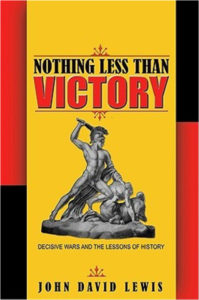
Nothing Less than Victory: Decisive Wars and the Lessons of History
John David Lewis
Princeton Uni Press (2013)
Rs3,806
The goal of war is to defeat the enemy’s will to fight. But how this can be accomplished is a thorny issue. Nothing Less than Victory provocatively shows that aggressive, strategic military offenses can win wars and establish lasting peace, while defensive maneuvers have often led to prolonged carnage, indecision, and stalemate. Taking an ambitious and sweeping look at six major wars, from antiquity to World War II, John David Lewis shows how victorious military commanders have achieved long-term peace by identifying the core of the enemy’s ideological, political, and social support for a war, fiercely striking at this objective, and demanding that the enemy acknowledges its defeat.
Lewis examines the Greco-Persian and Theban wars, the Second Punic War, Aurelian’s wars to reunify Rome, the American Civil War, and the Second World War. He considers successful examples of overwhelming force, such as the Greek mutilation of Xerxes’ army and navy, the Theban-led invasion of the Spartan homeland, and Hannibal’s attack against Italy—as well as failed tactics of defense, including Fabius’s policy of delay, McClellan’s retreat from Richmond, and Chamberlain’s appeasement of Hitler. Lewis shows that a war’s endurance rests in each side’s reasoning, moral purpose, and commitment to fight, and why an effectively aimed, well-planned, and quickly executed offense can end a conflict and create the conditions needed for long-term peace.
Recognizing the human motivations behind military conflicts, Nothing Less than Victory makes a powerful case for offensive actions in pursuit of peace.
John David Lewis is visiting associate professor of philosophy, politics, and economics at Duke University, and senior research scholar in history and classics at the Social Philosophy and Policy Center at Bowling Green State University. He is the author of Solon the Thinker: Political Thought in Archaic Athens and Early Greek Lawgivers.
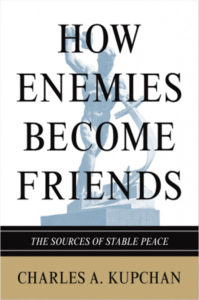
How Enemies Become Friends: The Sources of Stable Peace
Charles A. Kupchan
Princeton Uni Press (2012)
Rs3,806
Is the world destined to suffer endless cycles of conflict and war? Can rival nations become partners and establish a lasting and stable peace? How Enemies Become Friends provides a bold and innovative account of how nations escape geopolitical competition and replace hostility with friendship. Through compelling analysis and rich historical examples that span the globe and range from the thirteenth century through the present, foreign policy expert Charles Kupchan explores how adversaries can transform enmity into amity—and he exposes prevalent myths about the causes of peace.
Kupchan contends that diplomatic engagement with rivals, far from being appeasement, is critical to rapprochement between adversaries. Diplomacy, not economic interdependence, is the currency of peace; concessions and strategic accommodation promote the mutual trust needed to build an international society. The nature of regimes matters much less than commonly thought: countries, including the United States, should deal with other states based on their foreign policy behavior rather than on whether they are democracies. Kupchan demonstrates that similar social orders and similar ethnicities, races, or religions help nations achieve stable peace. He considers many historical successes and failures, including the onset of friendship between the United States and Great Britain in the early twentieth century, the Concert of Europe, which preserved peace after 1815 but collapsed following revolutions in 1848, and the remarkably close partnership of the Soviet Union and China in the 1950s, which descended into open rivalry by the 1960s.
In a world where conflict among nations seems inescapable, How Enemies Become Friends offers critical insights for building lasting peace. First published in 2010.
Charles A. Kupchan is professor of international affairs at Georgetown University and senior fellow at the Council on Foreign Relations. He served on the National Security Council during the Clinton presidency and is the author of The End of the American Era (Knopf).
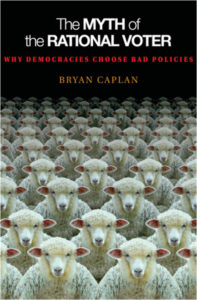
The Myth of the Rational Voter: Why Democracies Choose Bad Policies
Bryan Caplan
Princeton Uni Press (2008)
Rs3,806
The greatest obstacle to sound economic policy is not entrenched special interests or rampant lobbying, but the popular misconceptions, irrational beliefs, and personal biases held by ordinary voters. This is economist Bryan Caplan’s sobering assessment in this provocative and eye-opening book. Caplan argues that voters continually elect politicians who either share their biases or else pretend to, resulting in bad policies winning again and again by popular demand.
Boldly calling into question our most basic assumptions about American politics, Caplan contends that democracy fails precisely because it does what voters want. Through an analysis of Americans’ voting behavior and opinions on a range of economic issues, he makes the convincing case that noneconomists suffer from four prevailing biases: they underestimate the wisdom of the market mechanism, distrust foreigners, undervalue the benefits of conserving labor, and pessimistically believe the economy is going from bad to worse. Caplan lays out several bold ways to make democratic government work better—for example, urging economic educators to focus on correcting popular misconceptions and recommending that democracies do less and let markets take up the slack.
The Myth of the Rational Voter takes an unflinching look at how people who vote under the influence of false beliefs ultimately end up with government that delivers lousy results. With the upcoming presidential election season drawing nearer, this thought-provoking book is sure to spark a long-overdue reappraisal of our elective system.
Bryan Caplan is associate professor of economics at George Mason University. He is the coeditor of the Weblog EconLog.
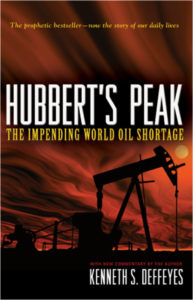
Hubbert’s Peak; The Impending World Oil Shortage
Kenneth S. Deffeyes
Princeton Uni Press (2008)
Rs2,154
In 2001, Kenneth Deffeyes made a grim prediction: world oil production would reach a peak within the next decade—and there was nothing anyone could do to stop it. Deffeyes’s claim echoed the work of geophysicist M. King Hubbert, who in 1956 predicted that U.S. oil production would reach its highest level in the early 1970s. Though roundly criticized by oil experts and economists, Hubbert’s prediction came true in 1970.
In this updated edition of Hubbert’s Peak, Deffeyes explains the crisis that few now deny we are headed toward. Using geology and economics, he shows how everything from the rising price of groceries to the subprime mortgage crisis has been exacerbated by the shrinking supply—and growing price—of oil. Although there is no easy solution to these problems, Deffeyes argues that the first step is understanding the trouble that we are in.
“Deffeyes has reached a conclusion with far-reaching consequences for the entire industrialized world. . . . The 100-year reign of King Oil will be over.” (Fred Guterl, Newsweek).
“Deffeyes makes a persuasive case. . . . This is an oilman and geologist’s assessment of the future, grounded in cold mathematics. And it’s frightening.” (Paul Raeburn, Scientific American).
Kenneth S. Deffeyes is professor emeritus at Princeton University. Prior to teaching, he worked alongside M. King Hubbert at the Shell Oil research laboratory in Houston.
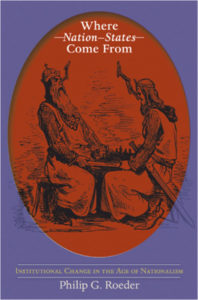
Where Nation-States Come From: Institutional Change in the Age of Nationalism
Philip G. Roeder
Princeton Uni Press (2007), Rs3,806
To date, the world can lay claim to little more than 190 sovereign independent entities recognized as nation-states, while by some estimates there may be up to eight hundred more nation-state projects underway and seven to eight thousand potential projects. Why do a few such endeavors come to fruition while most fail? Standard explanations have pointed to national awakenings, nationalist mobilizations, economic efficiency, military prowess, or intervention by the great powers. Where Nation-States Come From provides a compelling alternative account, one that incorporates an in-depth examination of the Russian Empire, the Soviet Union, and their successor states.
Philip Roeder argues that almost all successful nation-state projects have been associated with a particular political institution prior to independence: the segment-state, a jurisdiction defined by both human and territorial boundaries. Independence represents an administrative upgrade of a segment-state. Before independence, segmental institutions shape politics on the periphery of an existing sovereign state. Leaders of segment-states are thus better positioned than other proponents of nation-state endeavors to forge locally hegemonic national identities. Before independence, segmental institutions also shape the politics between the periphery and center of existing states. Leaders of segment-states are hence also more able to challenge the status quo and to induce the leaders of the existing state to concede independence. Roeder clarifies the mechanisms that link such institutions to outcomes, and demonstrates that these relationships have prevailed around the world through most of the age of nationalism.
“Given that most secession efforts are linked to conflict, including terrorism. . . . Roeder’s study should be valuable for scholars as well as policy-makers. Roeder addresses the crucial question of why some nation-state projects succeed while others fail in spite of the presence of factors generally regarded as essential for nationalist success: ethnic group identity, grievance against the central regime, mobilization of the people, and international recognition. By examining these factors within the framework of administrative structures. . . . Roeder shows that, in most cases, it is preexisting institutions…that produce the decisive ‘alignment’ of factors. Without this a nation-state is not likely to be established.” (R. P. Peters, University of Massachusetts at Boston, for Choice).
“Roeder’s knowledge of Soviet and Russian politics is impressive and students of nationalism will find this essential reading. Where Nation States Come From is highly recommended for students of nationalism, Eastern European and Central Asian politics and comparative politics and international politics in general.” (James G. Mellon, Political Studies Review)
Philip G. Roeder is professor of political science at the University of California, San Diego.

